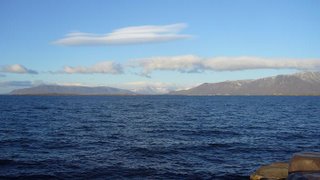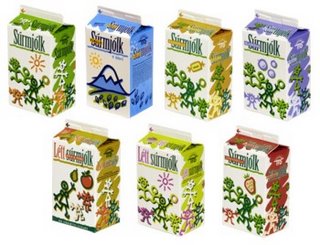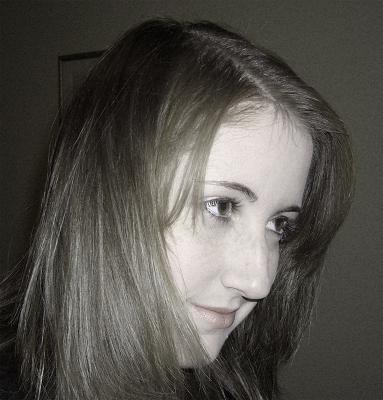Iceland - Land of Fire and Ice
Thoughts and experiences from the most islolated nation in the Western world
Tuesday, October 31, 2006
Saturday, October 28, 2006
Books
 Books are an unbelievably expensive good in Iceland. The taxes on them are incredible! Being a student of literature this of course doesn't make my life any easy. After having spent a fortune on some of the books necessary for my courses I decided to start using the slower way of ordering them cheaply with Amazon and having them send over. Now I've ordered 7 second-hand books, none that was worth more than 5 USD and this is what happened:
Books are an unbelievably expensive good in Iceland. The taxes on them are incredible! Being a student of literature this of course doesn't make my life any easy. After having spent a fortune on some of the books necessary for my courses I decided to start using the slower way of ordering them cheaply with Amazon and having them send over. Now I've ordered 7 second-hand books, none that was worth more than 5 USD and this is what happened:- 2 of them were delivered without any problems to my house downtown Reykjavik
- 3 of them I had to pick up at the post office in my area and I had to pay 20 USD of taxes on them!!! -> but they were not delivered to my house
- now the last 2 of them were held at the storage of the national post in 110 Reykjavik (SUBURB!!! in the middle of nowhere!!!). So yesterday, after having waited a month, I asked Anna if she could drive me there to finally pick up my two books. Upon arrival they asked me to sign a paper so they could open the packages. 10min. waiting. They came back saying that they did not know the values of the book, whether I still had the bill.... my jaw dropped. The next 15min. I've spend searching my mailbox to find some receipt of my orderings. Luckily I found them, printed them out and handed over. 15min. of waiting. The 2 packages were handed over, another 20 USD of tax paid and I left after 45min to walk home for another 90min. as I didn't want Anna to wait for me for such a long time.
NOW: why 3 different procedures for 7 items that have the same value??? Nobody from the post office has been able to answer my question. What I learned from it? Don't order books from Amazon, it comes cheaper to buy them dearly in the shop and you save so much time!!!
Friday, October 27, 2006
Sundlaugnar í Reykjavík
 Just like every tiny little village in Switzerland has a bank and each tiny little village in the Czech Republic has a pub with beer, every tiny little village in Iceland has a swimming pool: Swimming in Iceland is a national institution and that's where I also adapted to my new home - I'm swimming 3 times a week in a great swimming pool called Laugadalur: enjoying the olypia-sized pool, the hot pots and of course the atmosphere to swim outside in freezing temperatures.
Just like every tiny little village in Switzerland has a bank and each tiny little village in the Czech Republic has a pub with beer, every tiny little village in Iceland has a swimming pool: Swimming in Iceland is a national institution and that's where I also adapted to my new home - I'm swimming 3 times a week in a great swimming pool called Laugadalur: enjoying the olypia-sized pool, the hot pots and of course the atmosphere to swim outside in freezing temperatures."Swimming is a part of the icelandic lifestyle, wheather young or old, to visit the swimming pools in Iceland at least once a week to have a swim, to relax in the hot pools or to meet friends and have a chat. Icelanders have discovered the healthfull effect, the spring water has on people recovering from accidents or dealing with artitis and similar diseases. All of the Icelands swimming facilities have several hot pots, each kept at a different temperature, from 37°C & 42°C.
A unique aspect of Reykjavík's swimming pools when compared with Europe is that most are outdoors. Many undoubtedly shiver at the mere thought of bathing outside surrounded by frost and snow, but research has shown that there are various benefits associated with this. It is healthier for heart and asthma patients to be outside in hot water breathing fresh air than to breathe the warm, humid air of indoor swimming facilities. It also appears that the combination of warm water and cold air has a very positive effect on the human body.
It should be pointed out that no one gets cold in the pools as they are kept at an average temperature of 29°C. Swimming at Reykjavík's pools is indeed a unique experience that increases well being and improves overall health. When you travel around Iceland you will discover that every village or town has it's own pool to the delight of the traveler." (www.exploreiceland.is)
Thursday, October 26, 2006
Hjalti
 This is Hjalti - the manager of Hereford and a good friend! The first time I saw him I was stuck - this face represents a typical Reykjavikan male: blond hair, glases, style of clothes...
This is Hjalti - the manager of Hereford and a good friend! The first time I saw him I was stuck - this face represents a typical Reykjavikan male: blond hair, glases, style of clothes...Hjalti is the son of Sverrir who owns Hereford and some many hotels in Reykjavík and Akureyri, a very nice man who has lived for many years in Vienna. Hjalti's mother is Margarét, a famous singer and my vocal teacher now. Hjalti has studied in London, is a well-known DJ and of course an artist. He is a lot of fun to go out with! Hjalti is a great boss - he cares so much for his employees. Saturday nights are often very busy at Hereford as the restaurant enjoys a very good reputation throughout Reykjavik. Having many reservations leaves Hjalti in a rather nervous state - then he is just grateful for having such a good team. A typical characteristic is also his cellphone that is never found elsewhere than glued to his ear :o) I can't wait to have another good night out with him!
Gunnar Gunnarsson
 Another terrific person and definitely unique in this world is Gunni. Gunni is the head waiter at Hereford Steikhús and therefore my boss.
Another terrific person and definitely unique in this world is Gunni. Gunni is the head waiter at Hereford Steikhús and therefore my boss.The first evening I met Gunni was on my first night at Hereford where he hired me straight away and gave me a warm hug. This basically says everything about his warm heart and kind character. Since Þórkatla has left for Amsterdam, Gunni took over her shifts and we are therefore working together very often. Gunni is also the manager of "Shadow Parade" - an Icelandic rock band.
Gunni is the perfect person to have a good glas of red wine, listen to good music and talk to for hours and hours and hours. One can rely a 100% on him and he is really a true friend!
Sebastian Rinas
 A grand reason why I love my life in Reykjavík so much is definitely the amount of great people that I met and with whom I am spending my time. One such personality is Sebastian.
A grand reason why I love my life in Reykjavík so much is definitely the amount of great people that I met and with whom I am spending my time. One such personality is Sebastian.Because I know that he also reads this blog I really have to be careful about what I write ;o)
Sebastian is also an Erasmus exchange student. He originates from Berlin, studies philosophy and political sciences. We always have a lot of fun together: talking about different political attitudes, discovering Reykjavíks culture life, having tea at 2am, cooking Icelandic moss soup with too much sugar; dicussing Icelandic literature and mentality. Basically Seb is a great person to hang around with! I'm so glad I've met him!
Friday, October 20, 2006
Wednesday, October 18, 2006
Icelandic Skyr - Food of the Vikings
 Skyr is a unique non-fat dairy specialty and a traditional national dish. Made from fresh Icelandic cow´s milk, it has been a staple of the Icelandic diet since the Vikings first brought it with them when they settled the country more than 1,100 years ago.
Skyr is a unique non-fat dairy specialty and a traditional national dish. Made from fresh Icelandic cow´s milk, it has been a staple of the Icelandic diet since the Vikings first brought it with them when they settled the country more than 1,100 years ago.Through the centuries, Skyr was traditionally made on virtually every family farm, either from sheep’s milk or a mixture of sheep’s and cow’s milk. And while new flavors and recipes are finding their way to Skyr devotees around the world, the dish hasn’t lost touch with its pure, all natural beginnings.
The Viking settlers are believed to have brought the knowledge of Skyr-making with them from Norway, and developed it further after settlement. Since that time, however, the know-ledge of Skyr-making has been lost in Scandinavia, but remains an active part of the national identity of Iceland.
Skyr has a deliciously soft and creamy consistency, and looks rather like thick yogurt. In fact, the taste is somewhat reminiscent of yogurt. But Skyr is not a yogurt, it’s actually a type of fresh cheese. Because it’s made from fresh Icelandic skim milk, it contains no fat, but the nutritional value is very high, allowing Skyr to be eaten with cream and sugar without guilt. It’s also an excellent source of protein and calcium. Skyr is now available in many delicious varieties, either in its distinctive natural taste or mixed with fruits and other natural flavorings.
Icelandic soup
 Fjallagrasamjólk - Iceland Moss Soup
Fjallagrasamjólk - Iceland Moss SoupA very healthy, nourishing soup.
Iceland moss (Cetraria islandica) is very versatile. In spite of the name, it isn't a moss at all, but a lichen. It's used in cosmetics (especially creams and ointments), medicines and nutritional supplements (it is an excellent remedy for coughs and digestive problems), and as food. In olden times it was also used for colouring wool. In modern times, it is also used as a flavouring for a special schnapps.
Iceland moss also grows in other northern countries, but as it is very sensitive to pollution, it is not much harvested. It tastes very bitter when used in teas and infusions, but cooking it in milk, like in this recipe, removes most of the bitterness.
This soup is very nourishing and tasty. It is up to you if you choose to actually eat the moss or just use it as a flavouring (it gets pretty slimy when you cook it).
Tuesday, October 17, 2006
Airwaves 2006
 Iceland Airwaves takes place this week in Reykjavik. It is a major event on the Icelandic music scene, where both Icelandic bands along with foreign ones ocupy every club of Reykjavík for a week. Iceland Airwaves is an annual music event that started out in 1999 as a talent show for foreign record company executives, since then Airwaves has grown and blossomed and is now an integral part of the cultural life in Reykjavík. The fruits of the festival's labour have been ripening and today many Icelandic artists such as Quarashi, Minus, Sigur Ros, Apparat Organ Quartet, Trabant, Leaves and more have made their way to the International music scene.
Iceland Airwaves takes place this week in Reykjavik. It is a major event on the Icelandic music scene, where both Icelandic bands along with foreign ones ocupy every club of Reykjavík for a week. Iceland Airwaves is an annual music event that started out in 1999 as a talent show for foreign record company executives, since then Airwaves has grown and blossomed and is now an integral part of the cultural life in Reykjavík. The fruits of the festival's labour have been ripening and today many Icelandic artists such as Quarashi, Minus, Sigur Ros, Apparat Organ Quartet, Trabant, Leaves and more have made their way to the International music scene.Music is a very important part of the Icelandic culture. There are many clubs that feature live concerts all around the clock. Famous names are:
 Sigur Rós: Sigur Rós are an Icelandic post-rock band with melodic, classical and minimalist elements. The name is Icelandic for "victory rose".
Sigur Rós: Sigur Rós are an Icelandic post-rock band with melodic, classical and minimalist elements. The name is Icelandic for "victory rose".Thanks to my boss and very good friend Gunni I was introduced to the Indie-music scene. Gunnar is the manager of two bands: Indigo and Shadow Parade. They both write and play great songs. I also met Lay Low, Pétur Ben and other musicians thanks to Gunni.
 Indigo: Ingolfur Tor Arnason has worked under the artist name Indigo. He has recorded two cds and had a song on a colaboration CD of up-and-coming artists. His debut CD Escapism was released 2001 in a colaboration with 12 tonar. Shortly after the recording, Inglfur started working with Vala Gestsdottir (Viola, Singer) making Indigo a duet. Since than they have been busy playing around town and made some live appearances on TV and Radio. Through Icelandair and Reykjavk City, Indigo went to N.Y. 2004. They have now finished their third L.P. that will be released this year. Their music could be described as Alt. country.
Indigo: Ingolfur Tor Arnason has worked under the artist name Indigo. He has recorded two cds and had a song on a colaboration CD of up-and-coming artists. His debut CD Escapism was released 2001 in a colaboration with 12 tonar. Shortly after the recording, Inglfur started working with Vala Gestsdottir (Viola, Singer) making Indigo a duet. Since than they have been busy playing around town and made some live appearances on TV and Radio. Through Icelandair and Reykjavk City, Indigo went to N.Y. 2004. They have now finished their third L.P. that will be released this year. Their music could be described as Alt. country. Shadow Parade: Shadow Parade are a musical explosion in waiting. A blend of midnight melodies, bittersweet melancholy and sweeping romanticism. They are a reverse evolution, from the PC to a full blown six piece band. Shadow Parade moved from Akureyri to Reykjavík in pursuit of their music dream. With the relocation came a musical re-think.
Shadow Parade: Shadow Parade are a musical explosion in waiting. A blend of midnight melodies, bittersweet melancholy and sweeping romanticism. They are a reverse evolution, from the PC to a full blown six piece band. Shadow Parade moved from Akureyri to Reykjavík in pursuit of their music dream. With the relocation came a musical re-think.The duo decided the classic material they where producing would benefit from a boarder sound palate and the warmth of traditional instruments.
As a rhythm section they have a telepathic groove that only siblings can produce. With the advent of such rhythmic dynamism the hard drive was switched off and the songs began to blossom.
The music of all these bands is available on: www.myspace.com
Dinner invitation
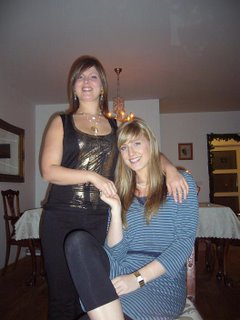 The first day I started to work at Hereford, þórkatla was there and introduced me to everyone and everything! She gave me an extremely warm welcome there and we always have so much fun working together! Unfortunately she is leaving to Amsterdam to join her boyfriend there and study. I will really miss her! We've spent quite some time together lately in the streets and restaurants :o) of Reykjavik. The photo shows þórkatla (very Icelandic name: þór, nordic god and katla, volcano in Iceland) and her younger sister Vala.
The first day I started to work at Hereford, þórkatla was there and introduced me to everyone and everything! She gave me an extremely warm welcome there and we always have so much fun working together! Unfortunately she is leaving to Amsterdam to join her boyfriend there and study. I will really miss her! We've spent quite some time together lately in the streets and restaurants :o) of Reykjavik. The photo shows þórkatla (very Icelandic name: þór, nordic god and katla, volcano in Iceland) and her younger sister Vala. Yesterday Gunni organized a staff party for þórkatla, a fare-well party as she has been an important longtime staffmember at Hereford. Before we went into Kaffi Vín I was invited to her home to meet her family and to have a good dinner. Her mother wanted to do Puffins for me (a speciality from the Vestmannaeyjar). As the last season was so bad the bird could not be found so we had wonderful Lasagne instead. I met her younger sister Vala, Vala's boyfriend Halli .
Yesterday Gunni organized a staff party for þórkatla, a fare-well party as she has been an important longtime staffmember at Hereford. Before we went into Kaffi Vín I was invited to her home to meet her family and to have a good dinner. Her mother wanted to do Puffins for me (a speciality from the Vestmannaeyjar). As the last season was so bad the bird could not be found so we had wonderful Lasagne instead. I met her younger sister Vala, Vala's boyfriend Halli . Inge, a friend of þórkatla is studying art. þórkatlas mother was extremely nice. I already got further invitations to traditional Icelandic food. Icelanders are so hospitable. It was a great evening!
Inge, a friend of þórkatla is studying art. þórkatlas mother was extremely nice. I already got further invitations to traditional Icelandic food. Icelanders are so hospitable. It was a great evening!
Friday, October 13, 2006
Gjúfrasteinn - The House of Halldór Laxness
 Gljúfrasteinn was the home and workplace of Halldór Laxness (winner of the Nobel Prize for Literature in 1955) and his family for more than half a century. It has now been opened to the public as a museum, unchanged from when Laxness lived there.
Gljúfrasteinn was the home and workplace of Halldór Laxness (winner of the Nobel Prize for Literature in 1955) and his family for more than half a century. It has now been opened to the public as a museum, unchanged from when Laxness lived there. Halldór Laxness (1902-1998) stands head and shoulders above the other Icelandic writers of the 20th century. He was prolific during his long career, writing 13 major novels, five plays and a dramatisation of one of his novels, not to mention his collections of short stories, essays and memoirs. His books have been translated into 43 languages and published in more than 500 editions. His career was unique, the diversity of his works almost without parallel, and with every book he can be said to have approached his readers from a new and unexpected direction.
Halldór Laxness (1902-1998) stands head and shoulders above the other Icelandic writers of the 20th century. He was prolific during his long career, writing 13 major novels, five plays and a dramatisation of one of his novels, not to mention his collections of short stories, essays and memoirs. His books have been translated into 43 languages and published in more than 500 editions. His career was unique, the diversity of his works almost without parallel, and with every book he can be said to have approached his readers from a new and unexpected direction.Laxness’s ideals and beliefs changed with time, as reflected to a certain extent in his works. He began his writing career as a Catholic, then turned to socialism, but later lost interest in all dogma – except perhaps Taoism. He never attempted to disown the earlier views which he subsequently repudiated, regarding them instead as an instructive part of his psychological development.
 Yet from the earliest period to the latest it is possible to detect the same basic themes in his books. He looked at things differently from other people, his writings were often barbed, and yet he always managed to see the comic aspects of his characters and their actions. His sympathy was invariably with the underdog.
Yet from the earliest period to the latest it is possible to detect the same basic themes in his books. He looked at things differently from other people, his writings were often barbed, and yet he always managed to see the comic aspects of his characters and their actions. His sympathy was invariably with the underdog.Homepage:
www.gljufrasteinn.is
 His best book and my favourite novel!
His best book and my favourite novel!
Ferðalag i miðvikjudögum
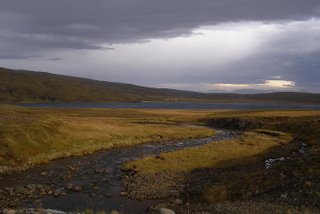 This wednesday Sebastian rented a car from his Icelandic contact person and we went to Mosfellbær to visit the Laxness museum.
This wednesday Sebastian rented a car from his Icelandic contact person and we went to Mosfellbær to visit the Laxness museum. Autumn has come over Iceland and it was great to get out of the city for a while and be out in the elements. The wind was strong, the colours in the plains breathtaking. We nearly crashed the car, but that's another story. For good photos, sacrifices have to be made :o)
Autumn has come over Iceland and it was great to get out of the city for a while and be out in the elements. The wind was strong, the colours in the plains breathtaking. We nearly crashed the car, but that's another story. For good photos, sacrifices have to be made :o)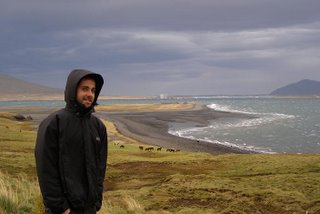 On the way back to Reykjavik we took a longer road around Mt Esja and along Hvalfjördur. This fjord is especially deep and therefore attractive for whales - "fjord of the wales".
On the way back to Reykjavik we took a longer road around Mt Esja and along Hvalfjördur. This fjord is especially deep and therefore attractive for whales - "fjord of the wales".
(Funny) Facts about Iceland
- 90% of Icelanders feel happy at work
- Icelanders live longer than any other European nation
 About 8000 Icelanders take happy pills on a daily basis -> Iceland is the happiest nation in the world
About 8000 Icelanders take happy pills on a daily basis -> Iceland is the happiest nation in the world
- 93% belong to the National Church
- 10% go to Church on a regular basis
- 73% of the population consumes alcohol
- one out of every ten male goes to rehab
- Iceland comes in second on a list of nations that are most advanced in using information technology
- Iceland holds the Nordic record in terms of sexual frequency
- Icelanders have a frequency record in terms of marriages and divorces
- Icelanders usually work 5-10 years longer than people in other Nordic countries
- Iceland holds the world record in:
- credit card use
- cocoa puffs consumption
- electricity use
- SOS children’s sponsors
- internet usage
- rules in poetry
- cinema admissions per capita
- susbscriptions to disney books
Dinner at Hereford
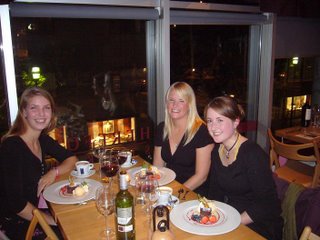 Tonight I invited my two girls to a dinner at Hereford. The food was terrific and the service awesome! Gunni spoilt us with good white wine for the Sushi, then a very good Riocha for our steaks and good Cognac with our desert. We so loved the food!
Tonight I invited my two girls to a dinner at Hereford. The food was terrific and the service awesome! Gunni spoilt us with good white wine for the Sushi, then a very good Riocha for our steaks and good Cognac with our desert. We so loved the food!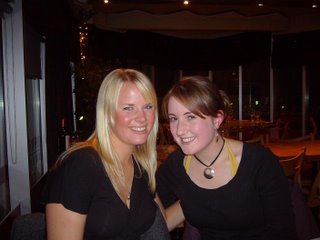 I was accompanied by Anna, whom you must already know from my blog and Koosje from Holland, namely Groningen and a friend of Rolinka :o) Later Sascha, Philipp and Sebastian joined us for the concerts.
I was accompanied by Anna, whom you must already know from my blog and Koosje from Holland, namely Groningen and a friend of Rolinka :o) Later Sascha, Philipp and Sebastian joined us for the concerts. That evening we went to a concert of Gunnis bands at a really great rock club called "Gaukur á Stöng". Iceland's oldest pub is now in it's early twenties. During the day it's a pool pub and on weekday evenings there are live rock concerts by a mix of mainstream and underground bands.
That evening we went to a concert of Gunnis bands at a really great rock club called "Gaukur á Stöng". Iceland's oldest pub is now in it's early twenties. During the day it's a pool pub and on weekday evenings there are live rock concerts by a mix of mainstream and underground bands.
Thursday, October 12, 2006
Can you take seriously a country called "Iceland"?
 How do you like Iceland is a documentary about Iceland and its culture. It has interviewed 37 foreigners from 9 nations that have all lived in Iceland for a while. It's the greatest movie ever and I will give you some samples and statements of it. They really express the true Iceland!
How do you like Iceland is a documentary about Iceland and its culture. It has interviewed 37 foreigners from 9 nations that have all lived in Iceland for a while. It's the greatest movie ever and I will give you some samples and statements of it. They really express the true Iceland!"What is to be expected other than shamefulness of people who live in boundless freedom, without the restrictions of consciousness or external discipline; of people who dwell for the most part in deserts or out at sea, with nobody keeping an eye on them." – quote by the Mayor of Hamburg in 1743 -
 Impressions from Reykjavik:
Impressions from Reykjavik:"People seem to be living in sheds, it’s the shed capital of the world"
"I think there is only one beautiful building"
"In Iceland, there is some terrible architecture. Terrible! You have to cope with the cold, you have to cope with the rain, you have to cope with the long dark days and nights. And then the architects dont help the situation. So shoot all the Icelandic architects, I'd say.”
"It didn't feel as alien as I thought it would. It almost felt more western than London in a strange sort of way."
Religion:
"Travel through some real wilderness and in the middle of nowhere there’d be a church."
"I have yet to find a religious Icelander."
"I think this is a country that still quietly practises pagan rituals."
 Icelandic mentality:
Icelandic mentality:"They don't feel like being at the edge of the world, they belive it to be the centre of the world."
"There is a craziness that all Icelanders have."
"You often read of Icelanders that they are special. Different. Sometimes in a good way, sometimes in a bad way. But even if it's the bad way it's a way that we embrace because it's an Icelander. They are not aweful, terrible or strange; they are just special."
"Every person is a personality. That is very characteristic for Icelanders. They are terribly individuals, in all respect I mean."
"You really have to feel ordinary if you come to Iceland because every one there is involved in something creative: arts, music, design."
"They wont be told!"
"I dont find Icelandic people polite. No "please" or "thank you"."
 Icelandic driving:
Icelandic driving:"The worst trait is the poor level of driving. It's almost like italy."
"You come from a population where everybody rode into town on a horse, they hitched it to the rail and went shopping. So now you are doing the exactly same thing with the cars. Nobody takes any notice of parking meters or nobody parks in the car park you just park on the side of the road. But the hilarious thing is definitely if you get two cars coming in opposite directions and they know each other.... then they stop and chat! Imagine that in the middle of London – people would go mad!"
Icelandic language:
"It sounds like people are attacking each other."
"I hate listening to icelandic radio, it gives me a headache."
"It sounds like a language that would have been spoken in lord of the rings."
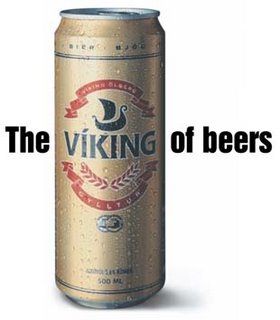 Icelandic drinking:
Icelandic drinking:"Getting out of the bar at 5am on a Saturday morning, it's not a pretty sight and I don't know how many Icelanders actually experienced it. But it is - it is shocking! It really is shocking!"
"All over the country people drink from Friday till Sunday. The students don't call it fösturdagur (friday) they call it floskudagur (bottle day)."
"Nobody is dancing or talking with the girls. And when finally the men start talking to the girls they are too drunk. It is very, very strange. I'm sure it's very good for foreigners because all those beautiful women are there and nobody is talking to them so it's an open field for them."
Alcohol prices:
"We met 8 or 9 people when we got there and went straight into a bar. And I bought the first round. Nobody else bought a round... it cost me something like 80 pounds. I thought something must be wrong! But it wasn't. So i waited for somebody else to offer a beer, but nobody did and then i went... ahhh!"
"Normally you drink to wake up in some ways but here you think that sometimes people drink to go to sleep."
Travelling around:
"I made the mistake of hitch hiking around Iceland because you don't get many cars. And then I got picked up by a fisherman and he said: "You're gonna have to drive because I'm drunk and I hadn't seen anyone for a good few hours and then I'm in a jeep with a drunk fisherman. It was kinda odd but very entertaining."
 Icelandic men:
Icelandic men:"Icelandic men are extremely gentle, extremely polite, extremely civilised which is not something you would associate with vikings."
"They all think that they are stong and menly but they are actually very conscious the way they dress I'm sure they spend lots of time in front of a mirror."
Icelandic style:
"Everyone knows each other – you always meet people you know, so you have to keep your image 24h a day."
"Icelandic people they are the biggest spenders I've ever seen on fashion."
My favourite quote:
"Iceland is alright. A bit cold, maybe. But we’re really optimistic about Global Warming."
Thursday, October 05, 2006
UGLA
 Different cultures - different customs - different universities. Comparing the University of Fribourg with the University of Iceland reveals many interesting aspects. The first keyword would probably be: technology. While looking for university news in Fribourg one still has to physically go to the building and check the departments notice board (if you are lucky the news will show up on the internet approximately 4 weeks later - stressing the IF). Many of our professors in Fribourg hardly know where the push on button is on a computer and they also have trouble operating the projector or beamer. Nota bene that most of the lecture halls don't even provide technical devises as beamers. Basically Fribourg has not followed the technical revolution of the past 50 years - and I doubt it is only a finance matter.
Different cultures - different customs - different universities. Comparing the University of Fribourg with the University of Iceland reveals many interesting aspects. The first keyword would probably be: technology. While looking for university news in Fribourg one still has to physically go to the building and check the departments notice board (if you are lucky the news will show up on the internet approximately 4 weeks later - stressing the IF). Many of our professors in Fribourg hardly know where the push on button is on a computer and they also have trouble operating the projector or beamer. Nota bene that most of the lecture halls don't even provide technical devises as beamers. Basically Fribourg has not followed the technical revolution of the past 50 years - and I doubt it is only a finance matter.Let's move to the 21st century and the University of Iceland. Each tiny little seminar room possesses the newest technical equipment. Professors only show up with fully prepared powerpoint presentations for each lecture. These presentations can be downloaded a day in advance from the internet so each student actually already has the slides during the lecture. Another detail. While I am still a old hard core student who turns up with a pen and notebook - the majority of Icelandic students use their newest laptops.
Another terrific thing is the university network called ugla (meaning owl). It is an account on the net which each student has. It contains all information about one's courses and all the information of the courses is posted there. All announcements, materials, discussions (which are really being used!) can be found there. One can buy printing quotas there with one's creditcard - imagine that in Fribourg!!!
Typical newspaper story from Iceland
 "A 67-year old German woman, Doris Kolberg, walked 60km in 14 hours to seek help. The car she and her husband were driving malfunctioned in the Icelandic outback two nights ago. The couple was driving near Herdubreidarlindir, north Iceland, when their car became stuck in a river. Water entered the engine so that the car stalled and they sere unable to call for help, as there is no mobile phone service in the area. Consequently Kolberg decided to set off on foot, walking for 14 hours until she reached the Ring Road at 6am. There she managed to flag down a vehicle driven by a farmer in the area. In an interview Kolberg was remarkably upbeat and claimed she was not at all tired from the walk, only a little stiff. "
"A 67-year old German woman, Doris Kolberg, walked 60km in 14 hours to seek help. The car she and her husband were driving malfunctioned in the Icelandic outback two nights ago. The couple was driving near Herdubreidarlindir, north Iceland, when their car became stuck in a river. Water entered the engine so that the car stalled and they sere unable to call for help, as there is no mobile phone service in the area. Consequently Kolberg decided to set off on foot, walking for 14 hours until she reached the Ring Road at 6am. There she managed to flag down a vehicle driven by a farmer in the area. In an interview Kolberg was remarkably upbeat and claimed she was not at all tired from the walk, only a little stiff. "
Tuesday, October 03, 2006
Westfjord trip
 On last monday night I got a phone call from Anna saying: "Hey, we are off to the Westfjords tomorrow for 5 days! You have to join us!" I was gutted - I couldn't cancel my shifts on such a short notice so this team had to leave on the greatest roadtrip without me! You can't believed how sad and disappointed I was! Soooo Stef, Anna, Sascha and Stef's brother Christopher (visiting from Germany) started off to the Westfjords.
On last monday night I got a phone call from Anna saying: "Hey, we are off to the Westfjords tomorrow for 5 days! You have to join us!" I was gutted - I couldn't cancel my shifts on such a short notice so this team had to leave on the greatest roadtrip without me! You can't believed how sad and disappointed I was! Soooo Stef, Anna, Sascha and Stef's brother Christopher (visiting from Germany) started off to the Westfjords. Its getting autumn here and the berry bushes are turning into the most beautiful colours.
Its getting autumn here and the berry bushes are turning into the most beautiful colours. Christoph is enjoying Iceland - this photo could be the main ad for 66north!
Christoph is enjoying Iceland - this photo could be the main ad for 66north! The sea at the Westfjords.
The sea at the Westfjords. My favourite waterfall Dynjandi foss.
My favourite waterfall Dynjandi foss.If you want to see what a real road trip in Iceland looks like and what Icelandic rotten shark looks like - watch Sascha's video about their trip:
www.youtube.com/watch?v=g4neF38kxoY
Once new, now familiar faces
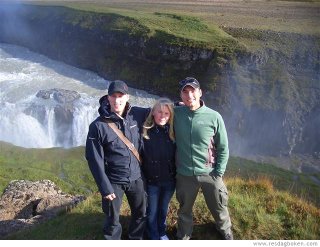 Life in Reykjavik is very familiar. If one goes out for a coffee or on a weekend night - definitely you bump into familiar faces!
Life in Reykjavik is very familiar. If one goes out for a coffee or on a weekend night - definitely you bump into familiar faces!Let me introduce you to some of them.
There we have Stefan and Sascha - two friends from Köln, Germany. And my Anna in the middle of course. Stef and Sascha have bought a white VW minibus, drove it up to Denmark, put it on the ferry, a week later got out in Seyðisfjorður and drove along the south coast to Reykjavik. They're both staying a semester. In december they are catching the ferry back home - IF the weather allows them to drive back to Seyðisfjorður in their van :o)
 Sebastian, Elena and Anna all live in the same cute house at Njarðarsgata downtown. I basically live with them. Basically means... I cook there, eat there, chat there... it's where you find me at 8am or 9pm or 2am if I'm not at uni or work. Sebastian is from Berlin, he's a good friend of mine and we spend a lot of time discovering Reykjavik's culture places or hanging around coffee places or bars and having philosophical discussions about the world. Elena comes from Barcelona and is just great! Anna, her and me go to the Icelandic language course together. Today when the teacher AGAIN taught us some grammatical rule and straight afterward she had to explain that in fact this rule only applies sometimes and that there basically are no rules in the Icelandic language. Her polite way of telling us is: "We have a special way of saying this..." Elena just looked at me with a very serious face: "This is no funny!" - yeah! We all can't really get the grip of this crazy language :o)
Sebastian, Elena and Anna all live in the same cute house at Njarðarsgata downtown. I basically live with them. Basically means... I cook there, eat there, chat there... it's where you find me at 8am or 9pm or 2am if I'm not at uni or work. Sebastian is from Berlin, he's a good friend of mine and we spend a lot of time discovering Reykjavik's culture places or hanging around coffee places or bars and having philosophical discussions about the world. Elena comes from Barcelona and is just great! Anna, her and me go to the Icelandic language course together. Today when the teacher AGAIN taught us some grammatical rule and straight afterward she had to explain that in fact this rule only applies sometimes and that there basically are no rules in the Icelandic language. Her polite way of telling us is: "We have a special way of saying this..." Elena just looked at me with a very serious face: "This is no funny!" - yeah! We all can't really get the grip of this crazy language :o) Another typical Saturday night out in Reykjavik. Elena, Anna and Carlos from Madrid!
Another typical Saturday night out in Reykjavik. Elena, Anna and Carlos from Madrid!
Sunday, October 01, 2006
From the poor house to a welfare state

For a long time Iceland belonged to the poorest countries in Europe. Only in the 20th century this changed completely - it switched from an underdeveloped agricultural country to a modern welfare society. Even though only a very small part of the country could be used for agricultural purposes, 100 years ago 50% of the population lived on farms on the coast lines. Nowadays this number droped to under 10%, where most farmers do sheep farming. (By the way: the blue in the flag symbolises the water, the white the ice and glaciers and the red the fire and magma)
 After the WW II the prior political aim was to boost the economy and ameliorate the living standarts of the population. The largest investments flowed into the fishing industry and the fish processing companies. Soon the country owned one of the biggest and most modern fishing fleets in the world. Nevertheless the number of people working in this sector dropped gradually but at times 90% of the exports were covered from this part of the economy. The main fishes being caught are cod, herring, redfish, haddock and halibut. With the incomes of the fishing industry Iceland finances the major part of its import of raw materials, food, fuel and engines.
After the WW II the prior political aim was to boost the economy and ameliorate the living standarts of the population. The largest investments flowed into the fishing industry and the fish processing companies. Soon the country owned one of the biggest and most modern fishing fleets in the world. Nevertheless the number of people working in this sector dropped gradually but at times 90% of the exports were covered from this part of the economy. The main fishes being caught are cod, herring, redfish, haddock and halibut. With the incomes of the fishing industry Iceland finances the major part of its import of raw materials, food, fuel and engines.Since the mid 90's Iceland's economy is stable. Today its per-capita income is one of the highest in the world. The problem is that Iceland, except for fish, energy and few agricultural goods, has to costly import most goods. Tourism is meanwhile the second largest income sector. The standart of living is comparable to the other scandinavian countries and is one of the highest in the world. A factor that shouldn't be underestimated for the high quality of living is surely the intact nature.
Aurora Borealis

Yesterday at 2am after our shift Þórkatla, Gummi, Dammý and me left Hereford over the balcony. Suddenly Dammý stopped me and said: "Look - northern lights!" I lifted my head and there is was - right over our heads. Green and blue colours rolling over the sky, just like snakes. It changed from green to white, yellow and red. I could not believe my luck. Even my local co-workers where struck by the beauty of it. We stood there for at least half an hour to watch this natural phenomenon.
 But how do these wonderful lights come into being? The visible aurora borealis, or northern lights, are caused by streams of charged particles from the sun, the solar wind, which are directed by the Earth's magnetic field towards the polar regions. Because the field curves downward in a halo surrounding the magnetic poles, the charged particles are drawn earthward.
But how do these wonderful lights come into being? The visible aurora borealis, or northern lights, are caused by streams of charged particles from the sun, the solar wind, which are directed by the Earth's magnetic field towards the polar regions. Because the field curves downward in a halo surrounding the magnetic poles, the charged particles are drawn earthward.



